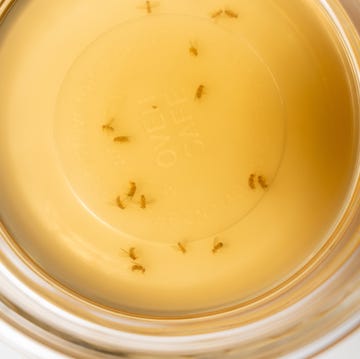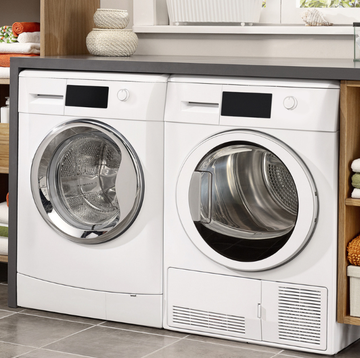- In an effort to make towels softer, some people are pouring a cup of white vinegar into their wash.
- While some swear by the "hack," we consulted Good Housekeeping's cleaning expert to find out if it's safe.
- Read on for the verdict, plus how to keep all of your favorite fabrics as soft as possible.
There's no shortage of cleaning and laundry tips out there, especially on social media platforms like TikTok (or more specifically, #CleanTok). From Swiffer hacks to broom trimming and beyond, I've covered it all, discussing whether or not those methods are helpful, safe, or worth it.
So now, when I see a "hack" gone viral, my first instinct is to question it. The tip this time around? Pouring white vinegar into the wash as fabric softener (specifically with towels).
To get to the bottom of the debate, I consulted Good Housekeeping Institute Home Care & Cleaning Lab Executive Director Carolyn Forté. Ahead, learn whether using vinegar in the wash is safe, plus other ways to keep your favorite towels and fabrics soft.
Should You Use Vinegar?
While many people are using vinegar in the laundry consistently and swearing by the results, Forté reveals that it's not actually the best idea, especially when done with every load.
"We don't recommend adding vinegar to the washing machine with any regularity. Over time it can degrade the hoses and internal parts of the machine," says Forté. "Once in a while likely won't hurt, but it's not something you should do often. I would recommend using a fabric rinse like Downy Rinse & Refresh instead to remove odors and residue and soften fabrics."
The bottom line? Use products that are specifically meant for the washing machine. Otherwise, certain household ingredients—like vinegar—may end up damaging it in the future.
5 Ways to Soften Fabrics
While adding vinegar to your next load might not be recommended, there are plenty of other safe tips and tricks to help soften fabrics.
✔️ Use dryer balls or fabric softener: As mentioned earlier, fabric rinse or softener can help remove odors and soften fabrics. You can also opt for dryer balls, which reduce static and wrinkles, helping your clothes stay soft.
✔️ Always measure detergent: "Avoid adding too much. It can leave residues behind that make clothing stiff. Only use what you need to get good cleaning," says Forté. If you notice your clothing feels stiff or the load still has suds after it's done, Forté recommends giving them a second rinse.
✔️ Avoid overloading the machine: When the machine is overloaded, clothing can't move around freely. This can lead to damage or residue build up, which could affect how soft the fabrics feel.
✔️ Shake clothes before loading them into the dryer: If your clothes are clumped coming out of the washer, it's best to shake them out before putting them in the dryer. This will help ensure they dry evenly without any stiffness in certain areas.
✔️ Be careful not to over dry: Over drying leads to shrinkage, pilling, and other damages that can cause fabrics to feel rough. When in doubt, air drying is always an option.
Laura Millar (she/her) is the assistant lifestyle editor for Good Housekeeping, where she covers home design. Prior to joining Good Housekeeping in 2024, she wrote for NBC's TODAY.com, where she covered everything from entertainment news to pop culture updates.














